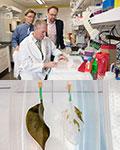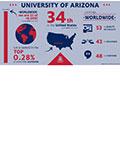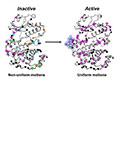UAHS News Archive
Jul 10, 2018
Researchers’ goal is to improve radiation testing through gene expression.
Jul 2, 2018
Lifelong cytomegalovirus infection may be beneficial, boosting the immune system in old age, when we need it most, according to a study led by University of Arizona researchers published in the Proceedings of the National Academy of Sciences.
Jun 20, 2018
UA College of Medicine – Phoenix scientists cross-utilize plant biology, medicine and engineering to create novel platform.
Jun 19, 2018
The five-year National Institutes of Health grant will enable Charles Downs, PhD, to study whether the non-pharmacological supplement curcumin can prevent lung injury.
Jun 19, 2018
As part of the National Institutes of Health’s “NIH in Your State” social media campaign about NIH investment in fiscal year 2017 and the impact of federally funded research on citizens’ health, the NIH recently tweeted that Arizona received $189 million in research support in FY2017. The University of Arizona Health Sciences received $70.3 million in NIH funding during FY2017, conducting research addressing statewide and global health challenges.
Jun 15, 2018
Rachna Shroff, MD, led a landmark study on the use of targeted drugs called PARP inhibitors in pancreatic cancer patients with BRCA mutations.
Jun 7, 2018
Some people who take statins to lower cholesterol have a slightly higher risk of developing type-2 diabetes. Genetic epidemiologist Yann Klimentidis, PhD, at the UA Mel and Enid Zuckerman College of Public Health received a $1.1 million grant from the National Institutes of Health to study the connection between type-2 diabetes and cardiovascular disease.
Jun 4, 2018
Melissa Herbst-Kralovetz of the University of Arizona Cancer Center and UA College of Medicine – Phoenix has found a direct relationship between “good” bacteria and cervical health and “bad” bacteria and increased cancer risk.
Jun 4, 2018
The four-year National Cancer Institute grant will enable Terry A. Badger, PhD, RN, PMHCNS-BC, FAAN, to study whether psychosocial interventions will help ethnically diverse survivors improve their symptoms.
May 31, 2018
University faculty's research output and influence earn high marks in the latest Center for World University Rankings.
May 24, 2018
Events are planned across the nation to engage diverse communities in the national recruitment effort. In Arizona, Banner Health and the University of Arizona Health Sciences have been enrolling volunteers into the program as a National Institutes of Health pilot site since 2017.
May 21, 2018
The UA's focus has been on helping people with chronic pain without using narcotics or other addictive drugs.
May 19, 2018
Surgeons at the University of Arizona College of Medicine – Tucson are developing a tool that may make detecting urine blockage simpler for patients.
May 17, 2018
The three-year Arizona Biomedical Research Commission Awards will fund research relating to neuropathic and cancer pain, migraines, opioids, antibiotics, antivirals, sinusitis, obesity, diabetes, Parkinson’s disease, pulmonary disease and pediatric acute-onset neuropsychiatric syndrome.
May 15, 2018
Interfering with the motion of a kinase enzyme might be a new approach for the development of anti-cancer drugs.
May 14, 2018
The Nogales Cardiometabolic Health and Sleep Study seeks to learn more about sleep health and sleep disorders in the border region, how sleep issues are related to social, behavioral and environmental factors and their potential role in regard to risk factors for cardiovascular disease and diabetes.
May 14, 2018
Researchers at the UA College of Medicine – Tucson have received $2.7 million to learn how stress can produce pain — and how to stop it from occurring.
May 8, 2018
Megha Padi, PhD, of the UA Cancer Center has developed a method for probing the genetic underpinnings of cancer and other diseases, which could lead to better treatments.
May 3, 2018
The University of Arizona Health Sciences and Banner Health have received a $9 million award from the National Institutes of Health for the All of Us Research Program. The program, which will total $60 million over five years, represents the largest NIH award in Arizona history and is tied to an effort to enroll 1 million or more participants across the country.
Apr 26, 2018
In Arizona, the findings were slightly lower, with 1 in 71 8-year-old children in Maricopa County identified with Autism Spectrum Disorder.





















